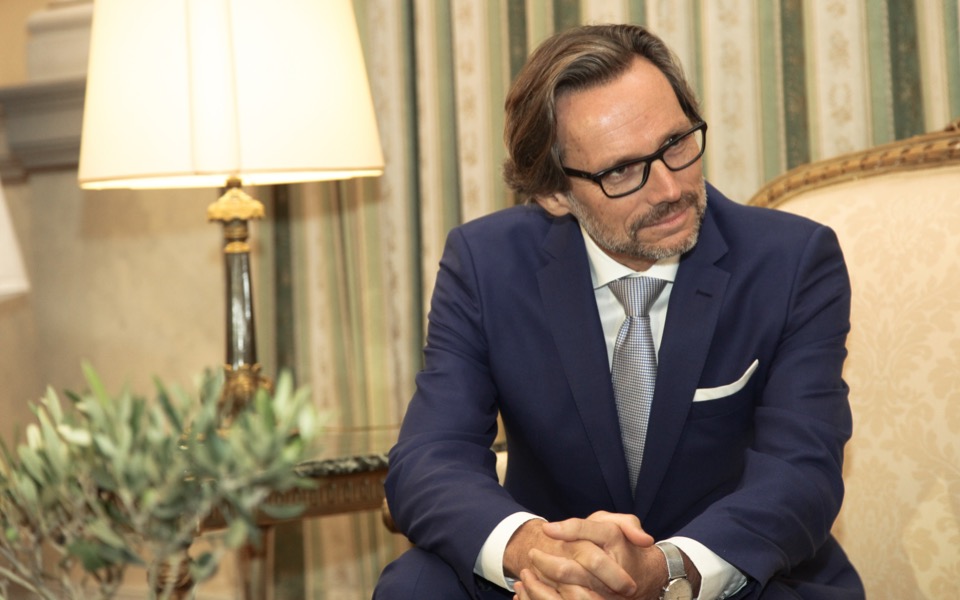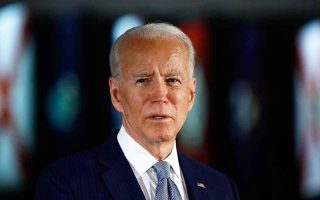German ambassador stresses need to focus on recovery, not debt talks

Greece should not consider next month’s elections in Germany as a milestone in its ongoing negotiations to pin down the details of debt relief measures, the newly appointed German ambassador in Athens, Jens Ploetner, told Kathimerini’s Sunday edition. Likewise, the Greek government should remain focused on the target of foreign supervision ending with the expiry of the current program in August 2018, though everything will depend on what happens up until then, he says.
In what was his first interview with Greek media since assuming the post, Ploetner says that Athens’s main objective should be creating an investment-friendly climate, adding that it would be a shame to see the sacrifices made since the start of the crisis going to waste.
Ploetner is no newcomer to Greece. He first visited the capital as a child and remembers being reprimanded for “trying to tidy up some rocks on the Acropolis.” He has also seen much of the country while sailing in the Aegean and Ionian seas, as well as in his capacity as spokesman to Frank-Walter Steinmeier when he was German foreign minister on all his official trips to Greece.
Your appointment comes as Greece enters the final year of its third bailout program. Do you think the country is ready for the day after?
No country can exist in a perpetual state of crisis. This is true of Greece too. My first impression is that after several difficult years, the country is now looking ahead, addressing issues such as how to attract foreign investment and promote research and professional training. I think this is wise because implementation of the program commitments and planning for the future are one and the same goal.
Are you concerned that Greece may slip back into its old habits once the program expires?
My concerns don’t matter here, only those of the Greek people. It is up to them to elect a government that will pay heed to their concerns and hopes for the future. From the many discussions I have had, I have formed the impressions that it is important to the Greek people that the mistakes which led to the crisis are not repeated; that they consider important an efficient public administration, the eradication of corruption and an efficient social security system.
When you presented your credentials, you said Greece needs to ensure that the sacrifices of the past few years don’t go to waste. It sounded a little like an insinuation.
We have become increasingly aware over the past few years in Germany of the profound changes brought about by the process of reform in Greece and the sacrifices this has meant for many people. It is hard to explain to someone who has to make it through the month on 300 euros that this contributes to the long-term health of public finances. Nevertheless, I am convinced it would be worse for those sacrifices to go to waste, if the reforms were reversed just before they started to yield fruit or if they were implemented without political backing.
What do you see after August 2018? A fourth memorandum or an end to foreign supervision?
I understand that the government is determined to complete the program by next August. With that in mind, Finance Minister Euclid Tsakalotos made a very important statement the other day: He said the more consistent Athens is with its commitments and its deadlines, the more international confidence and trust it will gain. The systematic building of this confidence is the most important factor in the country’s full return to international markets. So the honest answer to your question is: It depends on what happens up until August 2018. However, this is a goal worth attaining.
Will Greece get a clearer proposal for debt relief measures after the German elections? The government is putting a lot of stock in this.
I would recommend that the German elections not be considered a milestone in such issues. [Eurozone] finance ministers have already agreed on a timetable, which foresees that the matter of the structure of the debt be introduced into the agenda next year. Some argue that a favorable debt structure would constitute a significant incentive for investors. However, I would add that the current investment climate is just as important: Is the climate here favorable? Are the government and the state helping investments take place or not? So, until the discussion on debt sustainability begins, there is a lot that can be done to provide investment incentives.
Do you believe the government is doing enough in this direction? Some cabinet members have said or done things that are seen as hostile to investment.
It is not my place to hand out marks. Greece has a lot of natural advantages, but at the same time, competition for foreign investments is fierce. The more transparent the processes, the more efficient the public administration and the more legal security there is will make it that much easier for me as ambassador to advertise Greece to German firms so they can invest here.
You came to Athens at a very different phase than your predecessors. How do you imagine the Greek-German agenda after the program expires?
I am glad to see that the extreme exchange of stereotypes we saw at the peak of the crisis has given way for some time now to a more realistic approach. It’s ironic in a way, but we seem to know each other better after all those difficult times. I have to add that what really impressed me in those difficult years was that despite the criticism of policy in Berlin, the Greeks continued to welcome German citizens as guests to their country. I think that today we can start building again on a long history of close relations. I hope to expand and intensify cooperation even further in a range of fields, such as the sciences, culture and youth exchanges.
Isn’t it ironic that we are entering this phase with a government that started its career with extremely anti-German and anti-European rhetoric?
Being in government is a learning experience in any country. As the saying goes: Only a fool never changes his mind. This, after all, is the essence of European unification: recognizing that we can progress only when we are together and not when we are opposed to each other. The Greek-German Action Plan signed by foreign ministers Nikos Kotzias and his then counterpart Frank-Walter Steinmeier proves that we want to look forward.
Yet there have been some very strong voices in Germany in favor of Grexit…
At the peak of the crisis there was a lot of discussion for different solutions, it’s true. But the program signaled that a clear decision had been made and now we are all working toward the same goal: the successful implementation of the current program, which sets the foundations for economic growth and a bright future for a strong Greece in the eurozone.
Are you concerned by the fact that you will be faced with the question of German World War II reparations as ambassador to Greece?
I was born in 1967 and my father in 1945. The question is: How do we deal with Germany’s past? That is something I had to face quite early on in my career. My first foreign posting was in Israel, a post that is a significant challenge for any German diplomat. But it was a wonderful post, partly because of the way that Holocaust survivors sought dialogue with young German diplomats. They were all paradigms of humanity and human greatness. In my position here, I will always be on the front line in guarding the memory of events and victims. That is why on our first day here, my wife and I went to Haidari [the site of a WWII concentration camp in Athens] to pay tribute to the victims. I also went to Kommeno [where 317 villagers were massacred in Epirus]. I consider it important to keep memory alive. We owe it to the victims as well as to our children to learn from the past. And the most important thing: No war, ever again! Also: Human dignity is inviolate. In everyday politics, such a notion may seem abstract, but the recent past has shown us how quickly such principles come into doubt, such as, for example, when we started asking ourselves what we would do when the refugees from Syria came knocking on Europe’s door.
There is a prevalent sense that one of the reasons for closer ties between Athens and Berlin is that Germany agreed to the European Union’s deal with Turkey for migrant returns. There is also the sense that creditors will turn a blind eye over delayed reforms because of the refugee crisis.
These are two distinct issues. The difficult talks to complete the last bailout review are proof of the fact that no one is turning a blind eye; in contrast, everything is being observed with great detail and attention. It is, however, true that the cooperation between Greece and Germany over the refugee crisis is a model of European solidarity. It is a positive sign that [Migration Minister] Yiannis Mouzalas announced that Greece will take back some of the migrants from Germany under the Dublin II Regulation, while in the meantime, Germany will continue sharing Greece’s burden by taking in a few hundred refugees every month and helping with their care here in Greece.
Where does Turkey fit in, especially now that relations with Germany have soured?
Within the EU, Greece and Germany have a special relationship with Turkey. You because you are neighbors in terms of geography and us because we are neighbors in human terms – there are more than 3 million Turks in Germany. Turkey is important to both our nations, albeit for different reasons. So, it is especially painful to witness the turbulence in relations between Berlin and Ankara. We regret this and hope the government in Ankara will resume acting in a manner that befits two partners and which has for many decades shaped German-Turkish relations. Despite the difficulties with Ankara’s policy, our goal is still to keep the lines of communications open. And in this respect, the German and Greek positions are very close.
Speaking of geography, what role did the geopolitical factor play in decisions regarding Greece?
To begin with, let’s separate the two issues. There were no geopolitical concessions in the program because the program is not a list of punishments, but a list of necessary steps for Greece to exit the crisis. Therefore, any concessions would have been to the detriment of the country. Regardless, I have the impression that Greece’s strategic importance as the EU’s southeastern pillar has increased with the recent geopolitical turbulence and the difficult situation in the Eastern Mediterranean.
* This interview was translated from Greek.





